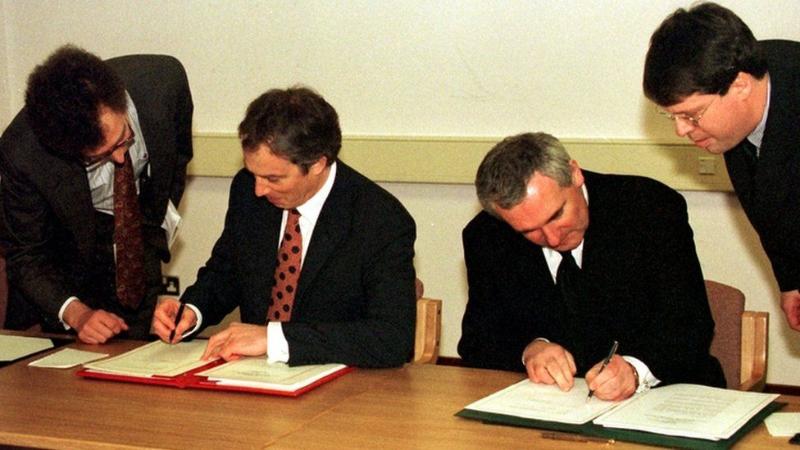Strand 01
Established two democratic institutions, the Northern Ireland Assembly and Northern Ireland Executive to make laws and decisions on most of the issues affecting everyday life in Northern Ireland.
The focus of the world was on Belfast when global political leaders past and present arrived in Belfast to mark the 25th anniversary of the Belfast/Good Friday Agreement (B/GFA) in April.
Former President of the United States, President Bill Clinton, and the Chancellor of Queen’s University Belfast, Secretary Hillary R. Clinton, were among the first global leaders to be announced as participants in the international conference marking the 25th Anniversary of the Belfast/Good Friday Agreement at Queen’s University. Speaking ahead of the event, Former U.S. Secretary of State and Queen’s University Chancellor Hillary Clinton, said:
“Northern Ireland and Queen’s University are both close to Bill’s and my heart. It’s fitting that such a unique event will take place at Queen’s. The University makes a significant impact on the world through its outstanding research and innovation. I am proud to host this conference, which will bring together civic leaders who have contributed to peace and reconciliation in Northern Ireland.”
The three-day conference was hosted by Queen's University Belfast in partnership with the the Global Federation of Competitiveness Councils, the Council on Competitiveness, Women in Business, Politics in Action, Commission for Victims and Survivors and the Lyric Theatre as well as Hillsborough Castle, where supporting events also took place, including a programme for schools.
President and Vice-Chancellor of Queen's University, Professor Ian Greer said: “This signature event to mark the anniversary of the Agreement offers the opportunity to reflect upon and recognise the achievements of 25 years ago, which has led to significant progress in Northern Ireland, delivering greater prosperity and a safer and more inclusive society. We also want to look forward to how we address the major issues impacting society today so we can build on the current peace over the next 25 years. We look forward to an insightful event.”
The conference had four themes:
“This conference provides a great opportunity to reflect on the achievements of the Belfast (Good Friday) Agreement 25 years on. Bringing together young people, business leaders and global political leaders past and present, this forum will provide a chance for architects of the Agreement and those benefiting from the Northern Ireland it helped to create to discuss progressing peace and prosperity. I look forward to supporting this event and collaborating with a number of partners as the Northern Ireland Office delivers its own ambitious programme of activity throughout the anniversary year.”
Rt Hon Chris Heaton-Harris, MP
Secretary of State for Northern Ireland
“On 10 April 1998, negotiators in Belfast agreed 'a truly historic new beginning.' 25 years on, we are grateful that Queen's University will host this important conference, to offer a moment of reflection on the peace and on remaining challenges. It brings together people from these islands, and further afield, to consider how we can work together into the future, to fully deliver the potential of the Good Friday Agreement. I look forward to these conversations, in the full spirit of 'partnership, equality and mutual respect', which the Agreement highlights."
Micheál Martin TD, Tánaiste
Minister for Foreign Affairs and Minister for Defence
The Belfast Agreement, also known as the Good Friday Agreement, was signed on 10 April 1998. It underpins Northern Ireland's peace, its constitutional settlement, and its institutions.
The Belfast Agreement was signed on 10 April 1998 following three decades of conflict known as the Troubles. The Agreement created a new power-sharing arrangement, including an Executive and Assembly, and was based on a series of fundamental principles including:

The Belfast/Good Friday Agreement consists of the Multi-Party Agreement between the UK and Irish Governments and the Northern Ireland parties, as well as the British-Irish Agreement between the UK and Irish Governments. It received the approval of voters on 22 May 1998, and came into effect on 2 December 2 1999.
The Agreement led to the establishment of three distinct political structures known as strands, which respectively relate to the governance of Northern Ireland, relations between North-South, and relations between East-West. Each of the three strands has equal importance:
Established two democratic institutions, the Northern Ireland Assembly and Northern Ireland Executive to make laws and decisions on most of the issues affecting everyday life in Northern Ireland.
Established the North-South institutions - the North-South Ministerial Council and the North-South Implementation Bodies - that support co-operation between Northern Ireland and Ireland.
Established the East-West institutions - the British-Irish Intergovernmental Conference and the British-Irish Council - that support co-operation between the United Kingdom and Ireland.